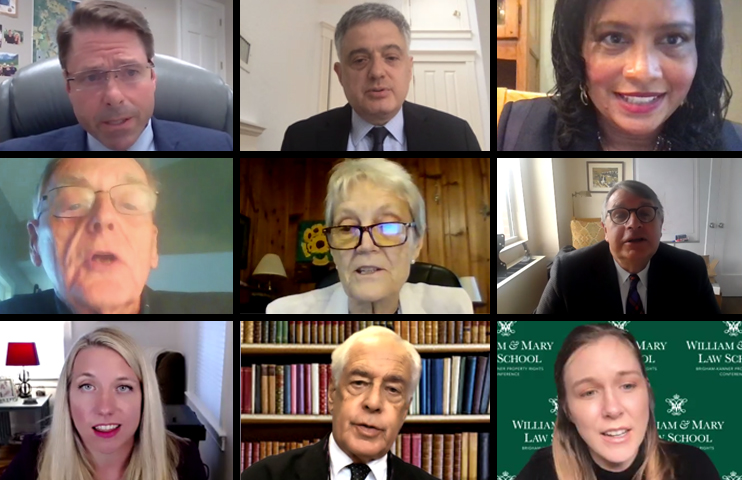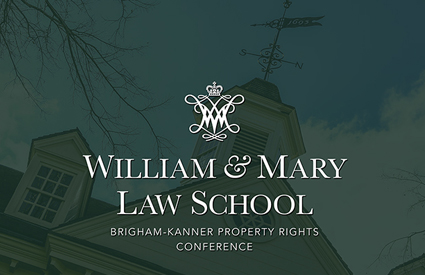William & Mary Law School’s Annual Property Rights Conference Brings Experts Together Virtually
Fourteen of William & Mary Law School’s 17 Brigham-Kanner Property Rights Conferences have been held at the Law School, and two have taken place overseas. This year’s conference had an even bigger reach—online, thanks to the COVID-19 pandemic. Bridging the miles through technology, members of the bench, bar and academia once again came together to explore recent developments in the law that affect property rights.
This year’s conference, held on October 1-2, opened with the Brigham-Kanner Property Rights Prize being awarded to Professor Henry E. Smith of Harvard Law School. The prize is named in honor of the lifetime contributions of Toby Prince Brigham, founding partner of Brigham Moore, LLP, and Gideon Kanner, professor of law emeritus at Loyola Law School in Los Angeles, and is presented annually to a scholar, practitioner or jurist whose work affirms the fundamental importance of property rights. Read more about Professor Smith.
During the presentation, Professor Smith shared how he became a property rights lawyer and offered a preview of his opening remarks for the conference. He also fielded questions from fellow attendees.
The following day, scholars and practitioners reconvened for panel discussions and moderated sessions. Panels (which are linked below to W&M Law School’s YouTube page) included:
Panel 1: Where Theory Meets Practice: A Tribute to Henry E. Smith (Moderator: Lynda Butler, William & Mary Law School). Panelists included:
- Henry E. Smith, Fessenden Professor of Law and Director of the Project on the Foundations of Private Law, Harvard Law School (opening remarks)
- Robert C. Ellickson, Walter E. Meyer Professor Emeritus of Property and Urban Law and Professorial Lecturer in Law, Yale Law School
- Carol M. Rose, Gordon Bradford Tweedy Professor of Law and Organization, Emerita, Yale Law School; and Ashby Lohse Chair in Water and Natural Resource Law, Emerita, University of Arizona College of Law
- Thomas W. Merrill, Charles Evans Hughes Professor of Law, Columbia Law School
- Steve Weise, Partner, Proskauer Rose LLP, Los Angeles, California
Panel 2: The Housing Crisis (Moderator: Myrisha S. Lewis, William & Mary Law School). Panelists included:
- Lisa T. Alexander, Professor of Law and Co-Director, Program in Real Estate and Community Development Law, Texas A&M School of Law
- Ezra Rosser, Professor, American University, Washington College of Law
- James S. Burling, Vice President for Legal Affairs, Pacific Legal Foundation, Sacramento, California
- Wendie L. Kellington, Attorney, Kellington Law Group, PC, Lake Oswego, Oregon
Roundtable: Emerging Issues in Takings and Eminent Domain Law (Moderator: Andrew Prince Brigham, Esq., Attorney and Managing Owner, Brigham Property Rights Law Firm, Jacksonville, Fla.). Panelists included:
- Maureen Brady, Assistant Professor of Law, Harvard Law School
- Christian Torgrimson, Partner, Parker Poe Adams & Bernstein LLP, Atlanta, Georgia
- Jeremy P. Hopkins, Partner, Cranfill Sumner & Hartzog LLP, Raleigh, North Carolina
- Stephen J. Clarke, Partner, Waldo & Lyle, P.C., Norfolk, Virginia
Panel 3: The Reach of Government’s Confiscatory Powers over Exigencies and Emergencies (Moderator: James E. Krier, University of Michigan Law School). Panelists included:
- David L. Callies, FAICP, Benjamin A. Kudo Professor of Law, William S. Richardson School of Law, University of Hawaii at Manoa
- Nicole Stelle Garnett, John P. Murphy Foundation Professor of Law, University of Notre Dame Law School
- George Homewood, FAICP CFM, Director of City Planning, Norfolk, Virginia
- Justin Hodge, Attorney, Marrs Ellis & Hodge LLP, Houston, Texas
Panel 4: The Risk of Unjust Compensation (Moderator: Mark F. [Thor] Hearne II, Esq., Founding Partner, True North Law LLC, St. Louis, Mo.). Panelists included:
- James W. Ely Jr., Milton R. Underwood Professor of Law, Emeritus, and Professor of History, Emeritus, Vanderbilt University
- Brian Angelo Lee, Professor of Law, Brooklyn Law School
- Andrew Prince Brigham, Esq., Attorney and Managing Owner, Brigham Property Rights Law Firm
- Jonathan D. Brightbill, Principal Deputy Assistant Attorney General, Environment and Natural Resources Division, U.S. Department of Justice.
Lynda Butler, Chancellor Professor of Law and Director of the Property Rights Project at William & Mary, was pleased with how smoothly the online event went, and before wishing everyone a safe virtual trip home, expressed her gratitude for the panelists’ presentations.
“I especially want to thank Henry Smith for all that he has done to stimulate our thoughts about property,” Butler said. “I feel like we're moving onto a new plane in terms of how we think about property.”
Papers from the conference will be published in Volume 10 (2021) of the Brigham-Kanner Property Rights Journal, published by the William & Mary Law School Property Rights Project.
About William & Mary Law School
Thomas Jefferson founded William & Mary Law School in 1779 to train leaders for the new nation. Now in its third century, America's oldest law school continues its historic mission of educating citizen lawyers who are prepared both to lead and to serve.
